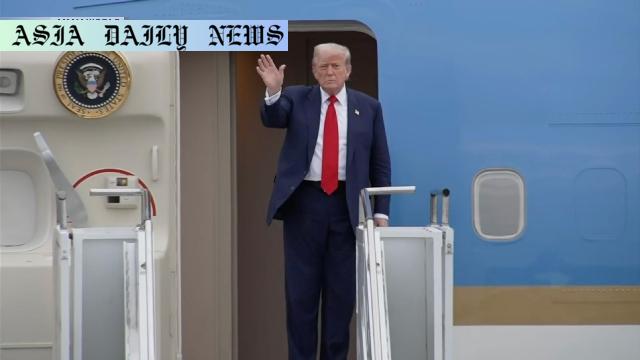Trump visit – US President Donald Trump arrived in Scotland today for a visit with UK and EU leaders, focusing on trade and diplomacy.

Trump Commences 5-Day Diplomatic Journey in Scotland
US President Donald Trump arrived in Scotland on Friday to initiate a five-day diplomatic trip, marking another milestone in global trade discussions. Scheduled to engage in key meetings with UK Prime Minister Keir Starmer and European Commission President Ursula von der Leyen, President Trump is set to prioritize economic ties and solidify the breakthrough trade agreements reached earlier this year. His arrival signifies an era of strengthened transatlantic relationships, with an optimistic outlook toward future economic collaboration.
One of the pivotal moments of President Trump’s visit will reportedly be his conversation with Prime Minister Starmer. Their meeting aims to revisit the ambitious trade deal announced in May, which Trump described as a ‘breakthrough’ in US-UK trade relations. By revising and underscoring the details of these agreements, both leaders aim to foster long-term economic prosperity while addressing potential challenges. Trade tariffs and industrial collaborations remain on the agenda during this focused dialogue, likely strengthening the global economic narrative.
Trump’s Strategic Engagement with EU Leaders
On Sunday, President Trump is scheduled to dialogue with European Commission President Ursula von der Leyen, aiming to discuss the broader landscape of EU trade ties. With Trump mentioning a ’50-50 chance’ for a trade deal with the EU, such a declaration hints at the ongoing negotiation intricacies. This meeting could chart a new course for the US-EU trade partnership, potentially paving the way for decreased trade barriers and increased market accessibility. While the specifics are speculative, both parties appear committed to fruitful discussions.
The emphasis on harmonious trade relations among the US, UK, and the EU is likely to benefit industries ranging from agriculture to tech. By addressing existing obstacles, mutual solutions might arise, benefiting companies and economies on both sides of the Atlantic. Trade analysts envision significant collaborations emerging from this exchange, notably within export-import ventures and service exchanges.
Personal Interests and Future Diplomatic Engagements
President Trump’s itinerary in Scotland includes scheduled visits to some of the golf resorts owned by his family’s business. These visits not only highlight his personal connection to the country but also offer a glimpse into the potential promotion of tourism and economic growth in Scotland. Such endeavors justify how personal interests can intertwine with professional diplomacy, often creating beneficial outcomes for both sides.
Adding to this, Trump is expected to return to the UK in mid-September upon the invitation of King Charles. This state visit will likely underscore key diplomatic progress achieved during the current trip and could set the foundation for future collaborations. Both the trade agenda and ceremonial diplomacy stand to benefit from such exchanges, ultimately reinforcing geopolitical rapport.
Implications of Trump’s Visit
Underlying this five-day visit lies a broader implication for international diplomacy. Trump’s engagement with two major geopolitical entities, the UK and EU, underscores the interconnected nature of global economies. The potential success or hindrance of these discussions could spark ripple effects, influencing other nations’ policies and ambitions. Through progressive and transparent negotiations, the visit’s immediate aftermath could resonate strongly across the global economic stage.
Overall, the outcomes of Trump’s Scotland visit are awaited with widespread anticipation. From detailed trade discourse to symbolic state endorsements, the visit embodies the multifaceted approach of modern diplomacy. As the globe watches these developments unfold, the takeaway will be a testament to the significance of well-structured negotiation frameworks and diplomatic goodwill.
Commentary
A Focus on Trade Diplomacy: Trump’s UK Visit
President Trump’s visit to Scotland marks a crucial intersection of diplomacy and economic ambition. His scheduled discussions with Prime Minister Keir Starmer underline a renewed focus on transatlantic trade relations. This dialogue reflects the leaders’ commitment to overcoming complex economic challenges while striving for mutual growth. Such bold initiatives hint at a more progressive and collaborative future, showcasing both countries’ dedication to shared prosperity.
EU Talks: An Opportunity for Economic Synergy
Trump’s upcoming dialogue with European Commission President Ursula von der Leyen provides an invaluable opportunity for broader collaboration. The ’50-50 chance’ he referred to regarding the EU trade deal signifies the uncertainties yet persistence in the process. The stakes are high, as substantial agreements could redefine market dynamics, create global opportunities, and address lingering trade imbalances. Negotiations like these define international leadership and set benchmarks for cooperative diplomacy.
Personal and Diplomatic Engagement
While this visit carries critical political and economic goals, Trump’s personal connection to Scotland adds an authentic touch to his itinerary. Visiting family-owned golf resorts might be scrutinized by some, but it also intertwines personal heritage with professional obligations. Such activities can indirectly promote local tourism, boosting Scotland’s economy in intangible ways. The balance between state affairs and personal narratives often impacts public perceptions of leadership.
Trump’s mid-September return as King Charles’ state guest further emphasizes strengthened ties. Opportunities such as this allow for deeper connections and alignment on shared global goals. This blend of formal and informal diplomacy reflects how modern leaders navigate diverse agendas effectively.
Overall, President Trump’s visit is a critical moment for global diplomacy. It demonstrates the importance of constant dialogue and shared purpose in shaping the future of international relationships. Such efforts are reminders of the intricate balance leaders must strike to build a stable, interconnected world.


